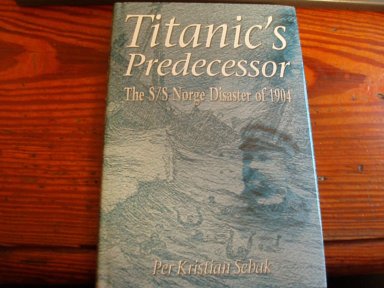
I bought this book on Amazon (last copy in stock in the UK), as it has some bearing on local history here. It is about the sinking of SS Norge in 1904, in which 635 passengers and crew drowned. This Scandinavian liner was crossing from Copenhagen, Christiania (now Oslo) and Christiansand to New York in late June 1904 when she hit rocks at Rockall. This is a tiny islet, rising 70 feet out of the Atlantic some 250 miles west of Scotland.
The Norge had insufficient spaces on board lifeboats for all the about 780 on board (in fact only 250), meaning a certain death for most. One lifeboat was wrecked as it was launched, others could only carry a few dozen. The ship, which carried emigrants from Russia and Scandinavia, went down 20 minutes after it struck rocks. Five lifeboats managed to get away. Survivors from four were picked up by other ships within about a week. A fifth boat was never recovered, and may have drifted into the Arctic - we shall never know. Survivors were landed at Grimsby (northern England), Aberdeen, Stornoway and Torshavn (Faeroes), in a pitiful state. Some died shortly after arriving on dry land; 11 of them lie buried in a communal grave at Sandwick, just down the road from me.
The book gives a good impression of life in the early 1900s, the huge wave of emigration to America that was taking place, as well as the appalling circumstances in which Jewish people were made to live in the Russian Empire of the Czars. It is heartwarming to read the welcome that survivors were awarded in all places they came ashore - it is heartrending to read the hardships they had to endure on the way there.
This entry is dedicated to the memory of those lost in the sinking of SS Norge.
